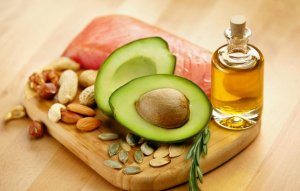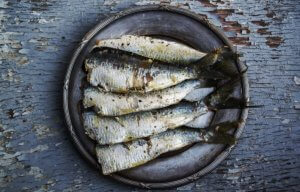Fatty Acids and Exercise

On many occasions, fatty acids and sports have been considered antagonistic words. The reason for this is that many people consider fatty acids as enemies of exercise, healthy diets and general well-being, But, this isn’t necessarily true.
The important relationship between fatty acids and exercise
Fatty acids and exercise are elements that should have a close relationship. The reason for this is that the fatty acids provide the fuel that the body needs to face the daily challenges that arise.
These are highly recommended nutrients to help you perform better in the face of a strenuous training session. Moreover, these acids favor the uptake of oxygen and some types of fats are as, or more, important to the athlete than proteins.
The fatty acids that are considered essential fulfill an important function. They protect the cardiovascular and immune systems and are extremely important for regulating hormonal and reproductive functions. They also improve breathing and the health of the body’s cells.
Types of fats
Fats are important and necessary to maintain a healthy and balanced diet. However, it’s essential to differentiate between good fats and bad fats in order to reduce the consumption of harmful fats.

In fact, fats from vegetable and animal origins, despite having the same caloric intake, have important differences in their physiological characteristics.
It’s important to determine the differences between the different types of fats and thus be able to select those that will contribute to the energy contribution of the body. In this sense, fats can be divided into two groups: saturated and unsaturated.
- Saturated fats are those that are detrimental to overall health. The regular consumption of them is associated with an increase in bad cholesterol (LDL). They also increase the chances of developing heart problems and some types of cancer; hence, their consumption should be moderate.
- On the other hand, unsaturated fats are those that belong to the good group. Contrary to saturated fats, regular consumption brings benefits to health, such as control of cholesterol levels (increases HDL cholesterol levels, the good), increased energy and disease prevention. It should be noted that unsaturated fats can also be monounsaturated and polyunsaturated.
Foods rich in fatty acids are good for the body
Fish
Fish is one of the foods that have the richest content of unsaturated fat. In fact, the fatty acid widely known as Omega-3 is found in large quantities in this food. It’s important to remember that Omega-3 is an excellent ally to control the levels of bad cholesterol in the blood.

Sardines, salmon, herring or tuna, among other bluefish, are a source of Omega 3.
Extra virgin olive oil
Olive oil is one of the key foods in the healthy Mediterranean diet. It can be used in many different ways, but it is particularly ideal for dressing dishes and salads.
Olive oil is a wonderful ally to prevent cardiovascular diseases. In addition, it contains high levels of vitamin E and phytosterols, which also help control cholesterol levels. We must bear in mind that we should avoid consuming it in fried foods.
Sunflower oil
Another essential ingredient that can’t be missed in the kitchen is sunflower oil. This is made from polyunsaturated fatty acids, which help reduce not only cholesterol but also triglycerides. It also has the positive effect that it reduces the formation of clots in the blood.
Nuts
Nuts also make up the other group of foods that contain healthy fatty acids. Their consumption, as long as it’s low in salt, is widely recommended by nutritionists.
Nuts are also ideal to have a healthy snack that lowers anxiety levels. You can combine them in salads and other light meals.
Fatty acids and sports should always maintain a good relationship. The most important factor is to learn to differentiate the types of fats and regularly consume good fats.
It’s important not to eliminate these fats from your diet since they are necessary for the body to develop healthily. This is especially important when performing difficult workout sessions.
On many occasions, fatty acids and sports have been considered antagonistic words. The reason for this is that many people consider fatty acids as enemies of exercise, healthy diets and general well-being, But, this isn’t necessarily true.
The important relationship between fatty acids and exercise
Fatty acids and exercise are elements that should have a close relationship. The reason for this is that the fatty acids provide the fuel that the body needs to face the daily challenges that arise.
These are highly recommended nutrients to help you perform better in the face of a strenuous training session. Moreover, these acids favor the uptake of oxygen and some types of fats are as, or more, important to the athlete than proteins.
The fatty acids that are considered essential fulfill an important function. They protect the cardiovascular and immune systems and are extremely important for regulating hormonal and reproductive functions. They also improve breathing and the health of the body’s cells.
Types of fats
Fats are important and necessary to maintain a healthy and balanced diet. However, it’s essential to differentiate between good fats and bad fats in order to reduce the consumption of harmful fats.

In fact, fats from vegetable and animal origins, despite having the same caloric intake, have important differences in their physiological characteristics.
It’s important to determine the differences between the different types of fats and thus be able to select those that will contribute to the energy contribution of the body. In this sense, fats can be divided into two groups: saturated and unsaturated.
- Saturated fats are those that are detrimental to overall health. The regular consumption of them is associated with an increase in bad cholesterol (LDL). They also increase the chances of developing heart problems and some types of cancer; hence, their consumption should be moderate.
- On the other hand, unsaturated fats are those that belong to the good group. Contrary to saturated fats, regular consumption brings benefits to health, such as control of cholesterol levels (increases HDL cholesterol levels, the good), increased energy and disease prevention. It should be noted that unsaturated fats can also be monounsaturated and polyunsaturated.
Foods rich in fatty acids are good for the body
Fish
Fish is one of the foods that have the richest content of unsaturated fat. In fact, the fatty acid widely known as Omega-3 is found in large quantities in this food. It’s important to remember that Omega-3 is an excellent ally to control the levels of bad cholesterol in the blood.

Sardines, salmon, herring or tuna, among other bluefish, are a source of Omega 3.
Extra virgin olive oil
Olive oil is one of the key foods in the healthy Mediterranean diet. It can be used in many different ways, but it is particularly ideal for dressing dishes and salads.
Olive oil is a wonderful ally to prevent cardiovascular diseases. In addition, it contains high levels of vitamin E and phytosterols, which also help control cholesterol levels. We must bear in mind that we should avoid consuming it in fried foods.
Sunflower oil
Another essential ingredient that can’t be missed in the kitchen is sunflower oil. This is made from polyunsaturated fatty acids, which help reduce not only cholesterol but also triglycerides. It also has the positive effect that it reduces the formation of clots in the blood.
Nuts
Nuts also make up the other group of foods that contain healthy fatty acids. Their consumption, as long as it’s low in salt, is widely recommended by nutritionists.
Nuts are also ideal to have a healthy snack that lowers anxiety levels. You can combine them in salads and other light meals.
Fatty acids and sports should always maintain a good relationship. The most important factor is to learn to differentiate the types of fats and regularly consume good fats.
It’s important not to eliminate these fats from your diet since they are necessary for the body to develop healthily. This is especially important when performing difficult workout sessions.
This text is provided for informational purposes only and does not replace consultation with a professional. If in doubt, consult your specialist.








